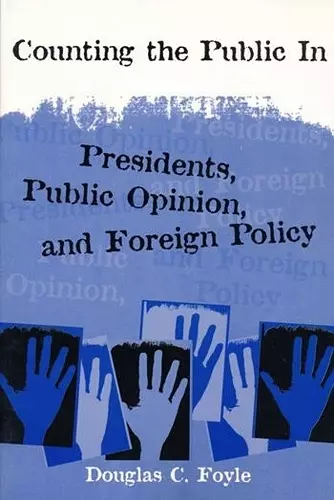Counting the Public In
Presidents, Public Opinion, and Foreign Policy
Format:Paperback
Publisher:Columbia University Press
Published:9th Jun '99
Currently unavailable, and unfortunately no date known when it will be back

The book examines the public's influence on foreign policy through case studies including the Formosa Straits crisis; intervention at Dien Bien Phu; the Sputnik launch; the New Look defense strategy; the Panama Canal Treaties; the Soviet invasion of Afghanistan; the Strategic Defense Initiative; the Beirut Marine barracks bombing; German reunification; the Gulf War; and intervention in Somalia and Bosnia.
Does the public alter American foreign policy, or does the government change public opinion to support its policies? This study demonstrates that the differing influence of public opinion is mediated largely through each president's beliefs about the value and significance of public opinion.Does the public alter American foreign policy choices, or does the government change public opinion to supports its policies? In this detailed study, Douglas Foyle demonstrates that the differing influence of public opinion is mediated in large part through each president's beliefs about the value and significance of public opinion.Using archival collections and public sources, Foyle examines the beliefs of all the post-World War II presidents in addition to the foreign policy decisions of Presidents Dwight Eisenhower, Jimmy Carter, Ronald Reagan, George Bush, and Bill Clinton. He finds that some presidents are relatively open to public opinion while others hold beliefs that cause them to ignore the public's view. Several orientations toward public opinion are posited: the delegate (Clinton) favors public input and seeks its support; the executor (Carter) believes public input is desirable, but its support is not necessary; the pragmatist (Eisenhower, Bush) does not seek public input in crafting policy, but sees public support as necessary; and finally, the guardian (Reagan) neither seeks public input nor requires public support. The book examines the public's influence through case studies regarding decisions on: the Formosa Straits crisis; intervention at Dien Bien Phu; the Sputnik launch; the New Look defense strategy; the Panama Canal Treaties; the Soviet invasion of Afghanistan; the Strategic Defense Initiative; the Beirut Marine barracks bombing; German reunification; the Gulf War; intervention in Somalia; and intervention in Bosnia.
A major scholarly work that adds greatly to our knowledge of the linkages between general public opinion and foreign policy. American Political Science Review
ISBN: 9780231110693
Dimensions: unknown
Weight: unknown
368 pages